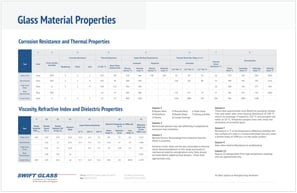Viscosity, Refractive Index and Other Important Glass Properties Involved in Material Selection
Leave a CommentGlass is among the most versatile of materials. Depending on its composition, treatment, and manufacture, it can be customized for high performance in countless applications.
 In order to get the right fit for your next glass project, remember to consult properties such as the corrosion resistance, thermal properties, viscosity, dielectric properties and refractive index of potential materials. These properties tell a lot about how a material reacts to its environment, which is especially important for your application’s performance.
In order to get the right fit for your next glass project, remember to consult properties such as the corrosion resistance, thermal properties, viscosity, dielectric properties and refractive index of potential materials. These properties tell a lot about how a material reacts to its environment, which is especially important for your application’s performance.
Sample Material: Borosilicate
When compared to other types of glass, borosilicate has a high corrosion resistance to acid, but a low corrosion resistance to weathering. Its thermal expansion is very low, and its volume resistivity and thermal shock resistance are both high — but not the highest. Its light transmission is excellent.
Pyrex® and Borofloat® are common types of borosilicate, though both Schott and Corning craft a series of variations with increasingly specific properties.
What does all of that mean?
Because of its resistance to high temperatures and chemical corrosion, borosilicate makes an excellent material for the biomedical and research industries. It’s also an ideal material for optical, lighting and industrial applications.
Because this is a glass that demonstrates strength without being the absolute strongest, borosilicate is an affordable material, making it extremely popular in many industries. Of all possible glass materials, it’s the Swift Glass choice for all of our annular edge glass. Its edges can be ground specially to be sealed in a flange for biomedical, research, optical, optoelectronic, photonics and analytical applications.
Other Material Options
For the toughest situations, traditional glass materials may not be enough — no matter how naturally strong. Thermal tempering and chemical strengthening can further prepare glass for high-intensity applications, such as:
- High Pressure Windows
- Explosion-Proof Windows
- Lighting Products
- Industrial and Residential Doors
The additional safety and dependability offered by tempered glass serves many industries, from automotive to medicine.
Resources for Selecting Materials
For quick reference, the Swift Team has assembled a Glass Material Properties Chart addressing some of our most popular material choices, ranging all the way from soda lime glass to fused silica. We also offer material consulting from our team of experts, as well as tempering services for specialty projects.
Download the Glass Material Properties Chart now, or contact the team to learn more today.




